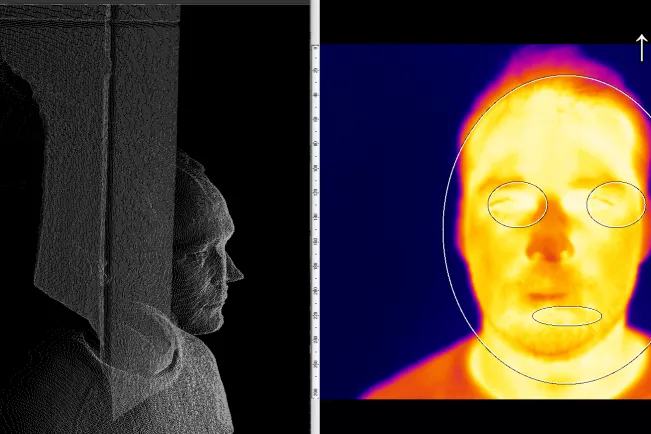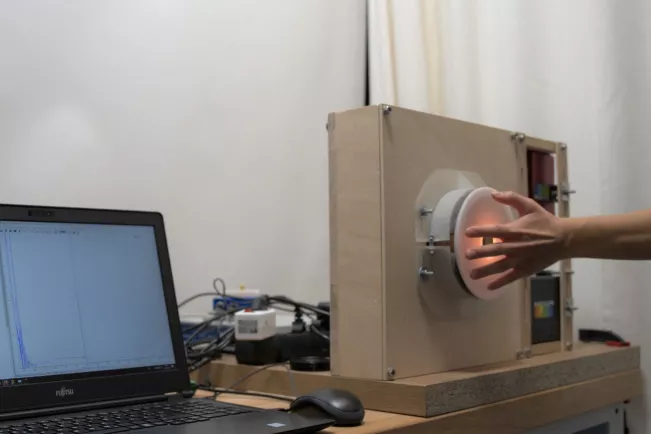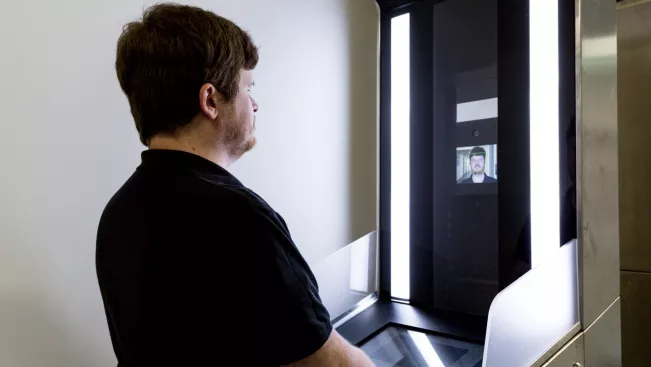Biometrics Evaluation Centre (BEZ)
Biometric long-term test series at the BEZ: test subjects wanted

Long-term test series at the BEZ
The BEZ focuses on the continuous and regular examination of biometric systems in the form of long-term test series. The test criteria are performance (recognition accuracy of the system), usability (ease of use) and transmission security of the systems. Sufficient statements on these criteria can only be made with the help of a large number of people who regularly test the systems on site.
Key data:
- Test systems: Automatic border control systems (eGates), fingerprint sensors, 3D cameras (including time-of-flight cameras), thermal imaging cameras, spectrometers, NIR point sensors, impedance measuring device. Further systems in planning.
- Wanted: about 100-150 test persons.
- Frequency: Approximately 1-3 times per week, preferably over as long a period as possible. No mandatory requirements regarding the duration of participation. If you are unable to take part in the test series for a longer period of time, this is also not a problem. Once you have registered, you can take part in the tests again at any time without prior registration.
- Registration and one-off enrolment (registration): If you would like to take part in the test series, first book an appointment for enrolment using the links above. Enrolment is a one-off enrolment process during which the reference data for the test systems under investigation are recorded. This includes a reference photo of the face and the reference images of the fingerprints. A detailed briefing is also provided, including an explanation of the applicable data protection measures and your rights under the General Data Protection Regulation. This first appointment with a one-off enrolment and briefing lasts around 20-30 minutes.
- Duration of the test appointments: Approximately 5-10 minutes (for the entire run-through).
- Participation requirements: Minimum age 18 years. No further requirements. For the project, we are looking for test persons who are as diverse as possible in terms of age, gender and skin type. We therefore welcome all interested participants.
Compensation for expenses
As a thank you for your participation, you will receive a voucher from Wunschgutschein worth €15 after every fifth appointment. This can be redeemed in numerous shops.
How do the tests work?
After enrolment you are registered and can take part in the tests. The first test run takes place directly after enrolment. Our operators supervise the test operation and are always available to answer questions.
Before each test run, you must first register at the BEZ self-service systems (kiosks). When registering, an electronic chip card with the reference photo and ID of the respective test person is written on it. The first test station are electronic passport control systems (eGates). At the eGates, the chip card serves as a substitute for a passport, which is placed on the gate's document reader and scanned. The test person enters the eGate and the gate opens after the data has been read in. A total of three eGates are tested. The fingerprints are then recorded on the fingerprint scanners, the palm and back of the hand are recorded on the spectrometers and on a near-infrared point sensor and, if necessary, the reference photo is re-taken.
You can come in for the tests at any time during our opening hours without an appointment (but no more than once a day, currently no more than three times a week).
Test and opening hours of the BEZ
Tuesday: 12:30 - 15:00
Wednesday: 12:30 - 15:00
Thursday: 12:30 - 15:00
The test series are also carried out during the semester holidays. More information on opening hours and contact details can be found here.
Which systems are tested?

Electronic passport control systems (eGates)
Long-term test series are of particular importance for eGates, as the effects of changing characteristics (skin, hairstyle, beard) are analysed here. This represents a challenge, particularly in view of the long validity of passports. Passport control systems of this kind are also known in Germany as EasyPASS and are already in use at major national airports.

Fingerprint scanners
On the one hand, the BEZ analyses the performance of different fingerprint scanners and compares them with each other. On the other hand, the recording of pressed fingerprints is compared with rolled fingerprints. Additional test criteria relate to the condition of the fingers, such as dryness and temperature.

3D cameras and thermal imaging cameras
3D cameras can determine additional depth information compared to conventional 2D cameras. Thermal imaging cameras allow the measurement of body temperature and heat distribution in the face. The additional information can be used to improve the reliability of existing facial biometrics systems or replace them in the long term.

Spectrometers and near-infrared (NIR) point sensors
The main aim of investigations using spectrometers is to improve the security of biometric recognition systems. They can be used to measure the optical properties of human skin in the visual and near-infrared range. Recognition systems use this information to detect falsified biometric features.
Have data deleted
‘Dear Sir or Madam
I hereby request the deletion of my personal data in the context of my participation as a test person in the Biometrics Evaluation Centre (BEZ) at Bonn-Rhein-Sieg University of Applied Sciences.’
To carry out the deletion, a one-time identity verification (e.g. with the identity card) is necessary vis-à-vis the data protection officer. After deletion, you will receive a written confirmation of deletion and a deletion log from the BSI data protection officer. Further data protection information can be found in our declaration of consent at the bottom of the page (PDF).
Contact points
Contact to the Biometrics Evaluation Centre (BEZ)
Campus
Sankt Augustin
Room
H100 - H114
Opening hours
Tuesday: 12:30 - 15:00
Wednesday: 12:30 - 15:00
Thursday: 12:30 - 15:00
Also open during the semester break.
